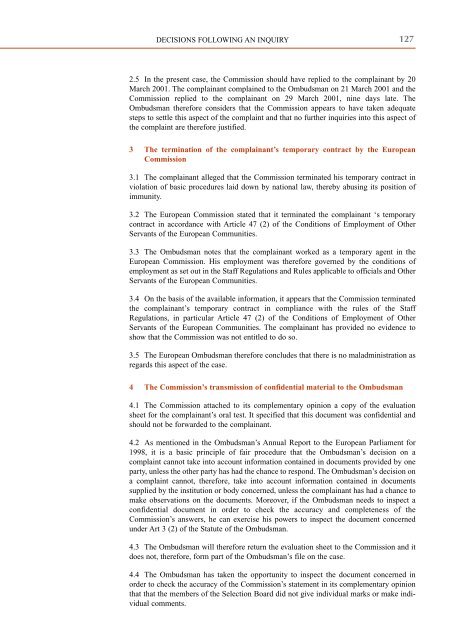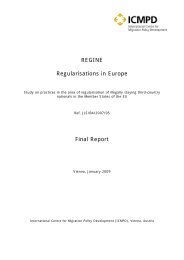Annual report 2002 - EOI
Annual report 2002 - EOI
Annual report 2002 - EOI
Create successful ePaper yourself
Turn your PDF publications into a flip-book with our unique Google optimized e-Paper software.
DECISIONS FOLLOWING AN INQUIRY 127<br />
2.5 In the present case, the Commission should have replied to the complainant by 20<br />
March 2001. The complainant complained to the Ombudsman on 21 March 2001 and the<br />
Commission replied to the complainant on 29 March 2001, nine days late. The<br />
Ombudsman therefore considers that the Commission appears to have taken adequate<br />
steps to settle this aspect of the complaint and that no further inquiries into this aspect of<br />
the complaint are therefore justified.<br />
3 The termination of the complainant’s temporary contract by the European<br />
Commission<br />
3.1 The complainant alleged that the Commission terminated his temporary contract in<br />
violation of basic procedures laid down by national law, thereby abusing its position of<br />
immunity.<br />
3.2 The European Commission stated that it terminated the complainant ‘s temporary<br />
contract in accordance with Article 47 (2) of the Conditions of Employment of Other<br />
Servants of the European Communities.<br />
3.3 The Ombudsman notes that the complainant worked as a temporary agent in the<br />
European Commission. His employment was therefore governed by the conditions of<br />
employment as set out in the Staff Regulations and Rules applicable to officials and Other<br />
Servants of the European Communities.<br />
3.4 On the basis of the available information, it appears that the Commission terminated<br />
the complainant’s temporary contract in compliance with the rules of the Staff<br />
Regulations, in particular Article 47 (2) of the Conditions of Employment of Other<br />
Servants of the European Communities. The complainant has provided no evidence to<br />
show that the Commission was not entitled to do so.<br />
3.5 The European Ombudsman therefore concludes that there is no maladministration as<br />
regards this aspect of the case.<br />
4 The Commission’s transmission of confidential material to the Ombudsman<br />
4.1 The Commission attached to its complementary opinion a copy of the evaluation<br />
sheet for the complainant’s oral test. It specified that this document was confidential and<br />
should not be forwarded to the complainant.<br />
4.2 As mentioned in the Ombudsman’s <strong>Annual</strong> Report to the European Parliament for<br />
1998, it is a basic principle of fair procedure that the Ombudsman’s decision on a<br />
complaint cannot take into account information contained in documents provided by one<br />
party, unless the other party has had the chance to respond. The Ombudsman’s decision on<br />
a complaint cannot, therefore, take into account information contained in documents<br />
supplied by the institution or body concerned, unless the complainant has had a chance to<br />
make observations on the documents. Moreover, if the Ombudsman needs to inspect a<br />
confidential document in order to check the accuracy and completeness of the<br />
Commission’s answers, he can exercise his powers to inspect the document concerned<br />
under Art 3 (2) of the Statute of the Ombudsman.<br />
4.3 The Ombudsman will therefore return the evaluation sheet to the Commission and it<br />
does not, therefore, form part of the Ombudsman’s file on the case.<br />
4.4 The Ombudsman has taken the opportunity to inspect the document concerned in<br />
order to check the accuracy of the Commission’s statement in its complementary opinion<br />
that that the members of the Selection Board did not give individual marks or make individual<br />
comments.
















